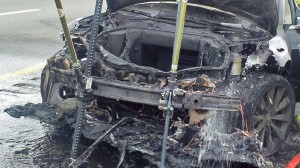
This image from Tennessee authorities shows damage to a third Tesla Model S to catch fire in six weeks.
Tesla, it seems, may be going from the frying pan right into the fire – and after receiving word of the third fire in six weeks involving the California start-up’s Model S battery sedan, federal investigators want to know why.
Following reports of the first Model S fire, which was blamed on heavy metal debris striking the battery pack of a vehicle driving through the Seattle suburbs in late September, the National Highway Traffic Safety Administration appeared to dismiss the incident as a fluke. But a second, and now a third, fire quickly followed and NHTSA is taking a closer look.
As with the Seattle blaze, authorities in Smyrna, Tennessee have issued a preliminary report suggesting the latest incident was caused by metal road debris somehow penetrating the armor surrounding the Model S battery pack. That led officials in Washington to advise that the agency will “contact” local authorities in Tennessee “to determine if there are vehicle safety implications that merit agency action.”
Even if NHTSA decides not to conduct a full-scale investigation, however, the latest news added to the downward momentum on Tesla stock which plunged 7.5%, or $11.39, yesterday. Traded on the NASDAQ as TSLA, the stock has fallen from a $194.50 peak in late September to just $139.77 at the end of the trading day on Thursday.
(For more on the latest Tesla Model S fire, Click Here.)
In all three incidents, the fires were centered within a limited section of the front battery pack, apparently contained by the firewalls Tesla designed into the Model S. And it appears that in each of the blazes onboard software advised the drivers to park and exit their vehicles. None of the fires resulted in injuries.
To the owners, anyway. But Tesla’s stock and its seemingly invincible image have clearly suffered a meltdown. Gordon Johnson of Axiom Capital Management said during a CNBC interview that, “I think the stock is grossly overvalued.” And even after the latest downturn, Johnson warned, “I think the correction is not anywhere near done, and I’m selling the stock.”
The three fires are only part of the problem, however. Despite coming in slightly ahead of the consensus forecast, analysts were generally cool in responding to Tesla’s third-quarter financial report. The California start-up declared a $16 million net profit, though that figure was based on adjusted accounting procedures. Using more generally accepted guidelines, known as GAAP, Tesla would have sunk $38 million into the red.
(Tesla announces it’s in the black – sort of. Click Here for more on its Q3 earnings.)
Complicating matters, CEO Elon Musk warned that Tesla is having trouble meeting the unexpectedly strong demand for the Model S – and is diverting some cars from U.S. showrooms to meet demand in Europe where the company is just setting up a distribution network. The big problem is a shortage of the car’s lithium-ion battery packs. Tesla recently expanded its deal with supplier Panasonic but won’t begin to receive a significant increase in batteries until next year.
The real question is whether the order bank will continue to outpace demand – or will potential buyers begin to unplug over worries that the three blazes were not isolated incidents.
“I wouldn’t be surprised if NHTSA does take a look, just to sort of check all the items off their list and make sure that they’re doing things that would preserve maximum safety to the public,” Wedbush Securities analyst Craig Irwin told CNBC. But he said he did not expect Tesla to feel any long-term impact from the fires – or its other recent challenges.
(Tesla one of the hottest products in America’s wealthiest neighborhoods. Click Here for the story.)

Considering the number of fires vs. cars sold, I’d say an investigation is warranted, especially when one of the fires was caused by simple road debris puncturing the battery pack and starting a fire.
Agree…you can accept fires after grave damage, not just hitting road debris
I am sure that this post will be deleted for asking the question, “what is aluminum ARMOR”?
NON-EXISTANT.
There is simply NO SUCH THING. NO ALUMINUM ARMOR.
There is a reason why they put steel armor on the Bradley “fighting vehicle”. The “aluminum armor” didn’t work.
Face the facts. In both of these incidents a piece of exhaust pipe punched a hole in the battery pack. I have run over REFRIGERATORS in gas powered vehicles and none lit on fire.
Elon is not a bright as people think. I think he is nothing more than a carnival barker with a lot of money.
Yes but you can make a lot of money if you’re good at charades…